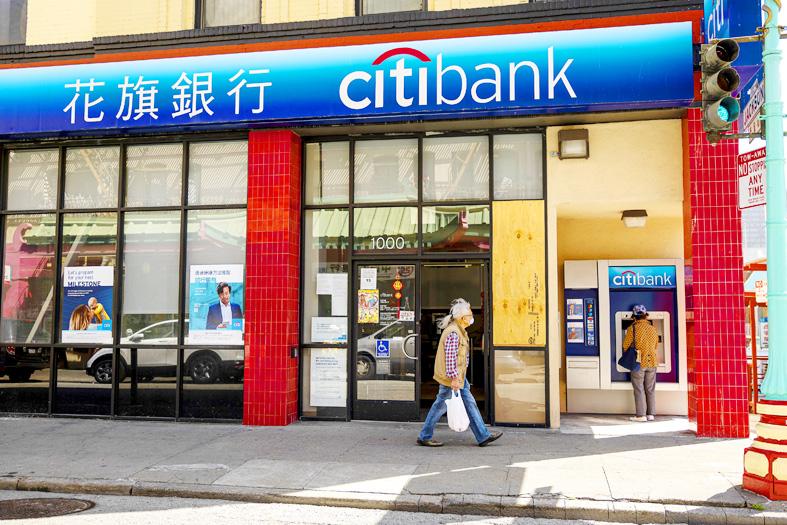Citigroup Inc plans to exit retail banking in 13 markets across Asia, and the region of Europe, the Middle East and Africa.
The bank would instead operate its consumer-banking franchise in both regions from four wealth centers in Singapore, Hong Kong, the United Arab Emirates and London, it said yesterday in a statement.
The move is part of an ongoing review of the company’s strategy by chief executive officer Jane Fraser, who took over last month.

Photo: Bloomberg
“This positions us to capture the strong growth and attractive returns the wealth-management business offers through these important hubs,” Fraser said.
Citigroup is to exit its consumer franchises in Taiwan, Australia, Bahrain, China, India, Indonesia, South Korea, Malaysia, the Philippines, Poland, Russia, Thailand and Vietnam.
The firm would continue to offer products in those markets to customers of its institutional clients group, which houses the private bank, cash-management arm, and investment-banking and trading businesses.
The withdrawal came as Citigroup reported record quarterly profit of US$7.94 billion, or US$3.62 per share, boosted by the flurry of blank-check companies it helped take public in the first quarter.
“While the other 13 markets have excellent businesses, we don’t have the scale we need to compete,” Fraser said. “We believe our capital, investment dollars and other resources are better deployed against higher returning opportunities in wealth management and our institutional businesses in Asia.”
Yesterday, the Financial Supervisory Commission said it has been informed by Citibank Taiwan Ltd (花旗台灣) about its parent company’s latest decision and that the bank would find a buyer for its consumer banking business in Taiwan.
Citibank Taiwan chairman Paulus Mok (莫兆鴻) told the commission that exiting Taiwan’s consumer banking market was a global strategy by its parent company and “had nothing to do with Taiwan’s business environment,” Banking Bureau Director-General Sherri Chuang (莊琇媛) said.
“It is not clear when the bank will sell its consumer banking business in Taiwan, but we will ensure that the rights of its clients, employees and consumers are protected,” Chuang said.
The bank might sell its consumer banking operations as a package, including the credit card business, wealth management business and the bank branches, she said.
The transaction could be similar to when Australia and New Zealand Banking Group Ltd sold its retail and wealth management businesses to DBS Bank Ltd, she said, adding that a transaction would need the commission’s approval.
Citibank is currently the largest foreign bank in Taiwan in terms of credit card business, commission data showed.

Intelligence agents have recorded 510,000 instances of “controversial information” being spread online by the Chinese Communist Party (CCP) so far this year, the National Security Bureau (NSB) said in a report yesterday, as it warned of artificial intelligence (AI) being employed to generate destabilizing misinformation. The bureau submitted a written report to the Legislative Yuan in preparation for National Security Bureau Director-General Tsai Ming-yen’s (蔡明彥) appearance before the Foreign Affairs and National Defense Committee today. The CCP has been using cognitive warfare to divide Taiwanese society by commenting on controversial issues such as Taiwan Semiconductor Manufacturing Co’s (TSMC, 台積電) investments in the

HELPING HAND: The steering committee of the National Stabilization Fund is expected to hold a meeting to discuss how and when to utilize the fund to help buffer the sell-off The TAIEX plunged 2,065.87 points, or 9.7 percent, to close at 19,232.35 yesterday, the highest single-day percentage loss on record, as investors braced for US President Donald Trump’s tariffs after an extended holiday weekend. Amid the pessimistic atmosphere, 945 listed companies led by large-cap stocks — including Taiwan Semiconductor Manufacturing Co (TSMC, 台積電), Hon Hai Precision Industry Co (鴻海精密) and Largan Precision Co (大立光) — fell by the daily maximum of 10 percent at the close, Taiwan Stock Exchange data showed. The number of listed companies ending limit-down set a new record, the exchange said. The TAIEX plunged by daily maxiumu in just

INVESTIGATION: The case is the latest instance of a DPP figure being implicated in an espionage network accused of allegedly leaking information to Chinese intelligence Democratic Progressive Party (DPP) member Ho Jen-chieh (何仁傑) was detained and held incommunicado yesterday on suspicion of spying for China during his tenure as assistant to then-minister of foreign affairs Joseph Wu (吳釗燮). The Taipei District Prosecutors’ Office said Ho was implicated during its investigation into alleged spying activities by former Presidential Office consultant Wu Shang-yu (吳尚雨). Prosecutors said there is reason to believe Ho breached the National Security Act (國家安全法) by leaking classified Ministry of Foreign Affairs information to Chinese intelligence. Following interrogation, prosecutors petitioned the Taipei District Court to detain Ho, citing concerns over potential collusion or tampering of evidence. The

‘COMPREHENSIVE PLAN’: Lin Chia-lung said that the government was ready to talk about a variety of issues, including investment in and purchases from the US The National Stabilization Fund (NSF) yesterday announced that it would step in to staunch stock market losses for the ninth time in the nation’s history. An NSF board meeting, originally scheduled for Monday next week, was moved to yesterday after stocks plummeted in the wake of US President Donald Trump’s announcement of 32 percent tariffs on Taiwan on Wednesday last week. Board members voted to support the stock market with the NT$500 billion (US$15.15 billion) fund, with injections of funds to begin as soon as today. The NSF in 2000 injected NT$120 billion to stabilize stocks, the most ever. The lowest amount it